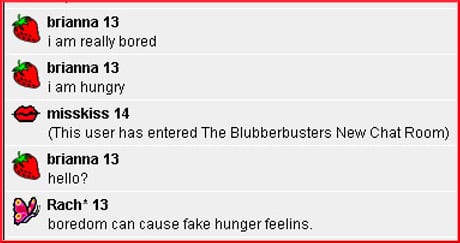
Dr. Pretlow has identified boredom as a source of stress, saying, “Many of the kids in our studies have little clue how to devise non-planned activities. Boredom is a staggering problem in obese youth.”
Boredom is a fertile ground for the growth of such pathological patterns as recreational eating, a modern phenomenon that we could very well do without. In the past, food was simply a necessity of life, and often there wasn’t enough of it. Other than a few privileged individuals, most humans were never faced with the problem of preventing obesity. Instead, they faced the challenge of consuming enough calories to sustain life and do the work necessary to procure the next day’s calories.
For most people, recreational eating was confined to a celebratory feast once or twice a year, and the rest of the time it was all about subsistence. Nowadays, recreational eating is a daily occurrence around the globe. Food is not just one aspect of some larger event or occasion — the food is the fun. Advertising persuades us that our very identities depend on the processed pseudo-foods we consume. If you’re young and interesting and just generally a fun person, you eat and drink certain things as a badge of belonging. So what if most of these fun foods are devoid of nutrition and potentially addictive? It’s the price of being hip.
Balance
A certain segment of American society has organized itself around the principle that no child should ever be without something to do, not even for a second — that children should constantly participate in a barrage of activities designed to improve and enrich their lives. This tendency has been described by Washington Post reporter Brigid Schulte as a status symbol and a form of cultural capital. Stressful as boredom might be for kids, she suggests that boredom avoidance can also be counterproductively stressful.
Why do parents feel compelled to sign their kids up for everything that’s available, and spend so much time transporting them to and from extracurricular activities? Let’s take for granted that they want the best for their children, but there is another reason — they fear criticism from others who regard a packed schedule as proof of good parenting. But with an overstuffed schedule, children never have a chance to explore the possibilities of using their own initiative to fill time, and are even more likely to suffer from boredom.
Writing about these issues for Today, Jacoba Urist spoke with parents whose son had been diagnosed at age 7 with a social anxiety disorder. The family relocated from downtown Chicago to the more laid-back environs of Austin, Texas, and made other changes to escape their accustomed “crazy-busy” lifestyle. Urist also spoke with Dr. Richard Larson of M.I.T., who believes that kids need unstructured time and the chance to figure out, on their own, how to fill it.
Your responses and feedback are welcome!
Source: “ ‘Overwhelmed’ moms choose NOT to be busy,” Today.com, 04/13/14
Image from blubberbuster.com

 FAQs and Media Requests:
FAQs and Media Requests: 











